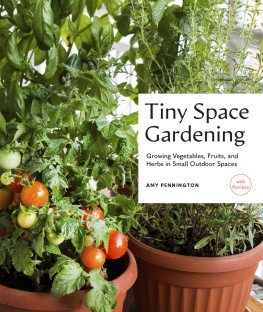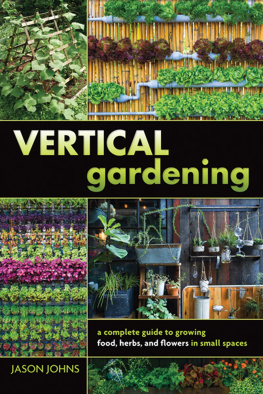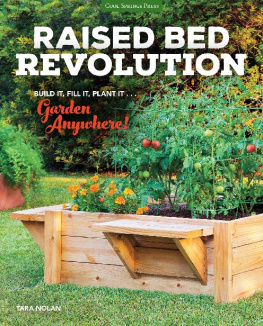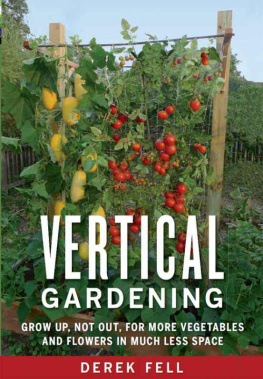GARDEN UP!
Smart Vertical Gardening for Small and Large Spaces
SUSAN MORRISON
REBECCA SWEET

www.coolspringspress.com
BRENTWOOD, TENNESSEE
Copyright 2010, 2011 Susan Morrison and Rebecca Sweet
All Rights Reserved. No part of this book may be reproduced or transmitted in any form, or by any means, electronic or mechanical, including photocopying, recording, or by any information storage and retrieval system, without permission in writing from the publisher.
Published by Cool Springs Press
P. O. Box 2828, Brentwood, Tennessee 37204
Digital edition: 978-1-61059-824-8
Softcover edition: 978-1-59186-492-9
Library of Congress Cataloging-in-Publication Data
Morrison, Susan, 1963
Garden up! : smart vertical gardening for small and large spaces / Susan Morrison and Rebecca Sweet.
p. cm.
Includes index.
ISBN 978-1-59186-492-9 (softcover)
1. Vertical gardening. I. Sweet, Rebecca. II. Title. III. Title: Smart vertical gardening for small and large spaces.
SB463.5.M67 2011
635--dc22
2010046528
EAN: 9781591864929
First Printing 2011
Printed in the United States of America
10 9 8 7 6 5 4 3 2 1
Managing Editor: Billie Brownell, Cover to Cover Editorial Services
Copyeditor: Jennifer Greenstein
Art Director: Sheri Ferguson, Ferguson Design Studio
Cover photos by Rob Cardillo. Cover garden designs by (from left) Fox Hollow
Design, Thomas Hobbs and Gasper Landscape Design.
Visit the Cool Springs Press website at www.coolspringspress.com.
You can find this title, other Cool Springs Press books, and other gardening books for sale at www.GardenBookstore.net.
TABLE OF CONTENTS
Acknowledgements & Dedications
This book could not have been written without the generous assistance of so many talented gardeners, designers, and writers. To all of the friends we have made through the Association of Professional Landscape Designers, Master Gardener groups, Blogging, Flickr, Facebook, and Twitter: thank you for your support and expertise! Likewise, we are deeply indebted to our wonderful clients, many of whom not only allowed us to photograph their gardens, but who gamely acted as guinea pigs as we experimented with new ideas.
We especially wish to acknowledge the following individuals, for sharing their knowledge, firing our creativity, and opening their gardens and nurseries to us: Angela Davis, Patrick Fizgerald, Emily Goodman, Jayme Jenkins, Theresa Loe, Lennart and Carla Lundstrom, Jim Martin, Kerry Michaels, Lisa Mitchell, Pam Penick, Jenny Peterson, Laura Schaub, Robin Stockwell, and Freeland and Sabrina Tanner.
To my husband Nicholas Bowerman, who didnt blink an eye when I naively declared writing a book sounded like a fun project, and who proceeded to support me cheerfully through every hair-pulling moment.
Susan
To Tom and Emily, for willingly eating a summers worth of frozen dinners while providing endless support and patience. Lots and lots of patience. To Michael and his 24/7 tech support. And to my mother, father, and grandmother, whose love of gardening provide me with unlimited inspiration.
Rebecca
Invasive Plants
An invasive plant is defined as any nonnative plant that adversely affects the habitat it invades. Left unchecked, invasive plants can overwhelm native vegetation, harbor pests that are harmful to other plants, and even alter the genetic makeup of native species. Tens of millions of dollars are spent each year in an effort to control the damage done by invasive species.
While some plants that have invasive root systems, such as culinary mint, may be controlled by planting in containers, keep in mind that many plants propagate by seed. Even if you are vigilant about controlling new shoots or seedlings in your own garden, wind, birds, or animals can spread seeds many miles away.
Because vastly different cultural conditions may exist between one region and another, a plant that is well behaved in one part of the country may be invasive in another. Therefore, a plants inclusion in this book is not a guarantee that its suitable for your area. To ensure youve made a good choice, check with your states invasive plant list before planting any species you are unfamiliar with.

Noninvasive in dry, western climates, Berberis thunbergii has invaded open spaces in over twenty states throughout the Midwest and Northwest, where it has caused significant damage.
Introduction
Why Garden Up?
When you hear the phrase vertical gardening, what comes to mind? You might think about roses scrambling up a trellis, or an overhead arbor dripping with wisteria. Those in search of a more contemporary style may envision a mosaic of succulents hung on an outdoor wall, while edible gardeners see a riotous mix of creative containers, with tomatoes and peas reaching for the sun. Perhaps you garden on a balcony or in a narrow backyard and gardening up is your secret weapon to getting the most out of a small space.
Vertical gardening is all of these things and more. Whether you need help solving a specific problem or are in search of inspiration, this book will show you how to take your landscape to the next level by maximizing vertical spaces. The good news is you dont have to be an expert gardener to take advantage of this exciting trend. Weve tapped into our combined twenty years of experience as garden designers to share our best design strategies, plant choices, and how-to advice. Garden Up! is packed with inspiring and informative photos as well as a feature we call Design Spotlight that points out specific vertical gardening solutions. For the do-it-yourselfer, weve included several projects that can be accomplished in a day or a weekend.
Although vertical gardening is a relatively new term, people have long been taking advantage of vertical spaces. Incorporating an arbor or trellis is still one of the easiest and most effective ways to add a third dimension to your landscape. , Arbors and Trellises, shows you how these timeless garden structures can increase curb appeal, carve out intimate spaces, or tame unruly gardens. You will also find our tips for selecting the right arbor or trellis for your home.
While it might be true that thin is in, most people prefer to have planting beds that are deep enough to accommodate a mix of shrubs and flowering plants. Yet even the largest gardens usually have an awkward spot or two that defy traditional planting techniques. In , Skinny Spaces, we share some of our favorite design strategies for narrow areas and introduce you to a whole new way of thinking about layers in a garden bed. We even tackle the ultimate skinny spaces: long and narrow side yards.
, Garden Secrets, might just as easily have been named Eyesores Galore! Whether its an ugly chimney, a boxy air-conditioning unit, or a neighborhood utility pole, almost every yard or garden has something you wish would just disappear. While we cant cross our arms and blink them away, Garden Secrets offers suggestions on how to disguise some of the most common visual problems that homeowners deal with.
, Urban Gardens, addresses the unique set of challenges those who garden on small balconies or in tiny courtyards face. Whether its finding space, choosing a container, or designing a focal-point wall, we offer a range of vertical approaches to turn these often underused spaces into cozy urban retreats.









